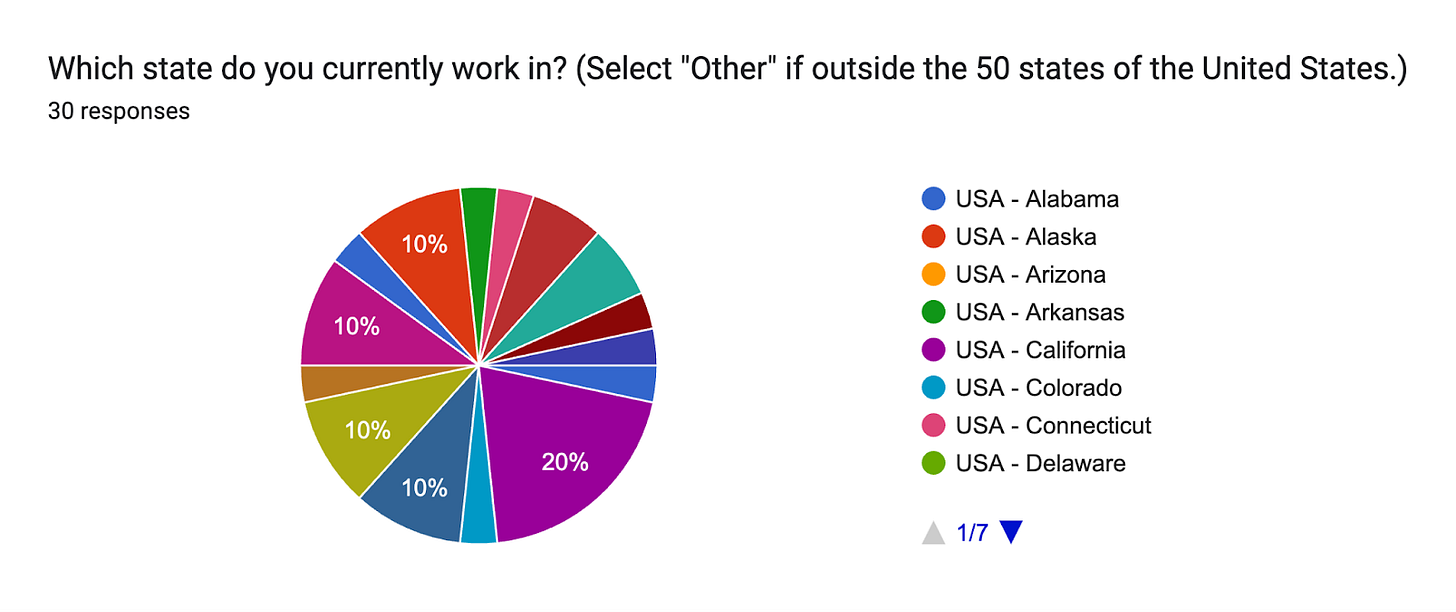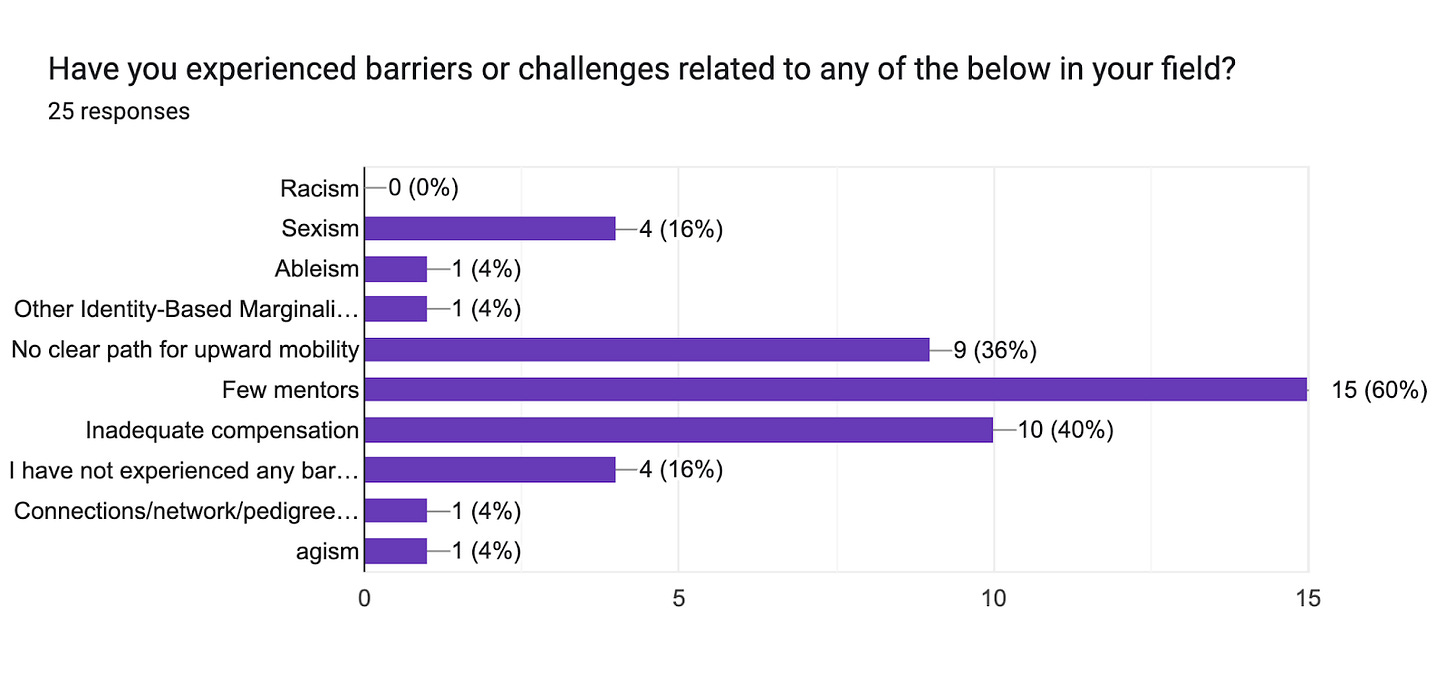Urban Career Advice from the Inside
No one has all the secrets, but here are some tips on how to progress in the field and overcome barriers.
The Emerging New Urbanists is a group of 260+ young professionals who associate with the progression of their careers in Urbanism - a field which is intrinsically interdisciplinary. This means we encompassed over 200 unique people with unique perspectives, backgrounds, and jobs. To help us demystify the field of New Urbanism, we asked our members nosy, anonymous questions about their salary, career barriers, and future prospects. About a sixth of our members responded.
Who are our peers?
First and foremost, we are a diverse group - in our backgrounds, races, and work experiences. There are many roads to urbanism. Just over 1/3 of new urbanists had a previous career that was relevant to New Urbanism. In our group, previous careers unrelated to urbanism include paralegal, education, non-profits, healthcare, and journalism. This shows the fluidity of urbanism - and especially young professionals. These careers merged with passions, and in some cases serendipity, bringing us into the realm of new urbanism. Currently, we comprise urban planners, designers, architects, economic development professionals, government administrators, valuations analysts, real estate agents, civil engineers, general contractors, and college/ high school/graduate school students. Most ENU members have worked in new urbanism for 1-6 years.
As of February 2024, our ages range from <18 up to 40. We are at all points of our professional lives, although commonly linked by being in our first decades of our careers in urbanism. Racially, 64% of survey respondents identified as White, with 16% identifying as Black/African American, 12% as Hispanic, and the remaining as Asian or mixed races. Amazingly, the ENU survey respondents represent a similar or higher ratio of diversity than the 2020 United States Census, despite many of our careers (architecture, engineers, etc.) having below average rates of diversity.
ENU’s members are spread across the United States. Members work from home, in downtown office buildings, from city halls, and even from rickety pop up tables on charrettes. 60% of us work at a for-profit private company, 20% for the government or public company, and the remaining 20% are students, business owners, unemployed, or non-profit employees. A quick visual breakdown of our members’ diversity:
Even with this range of careers, a common thread behind the new urbanists is that they discovered new urbanism as a passion. 45% of new urbanists that completed our survey completed graduate school after college - architecture bachelors into urban planning masters being the most common pursuit. Additionally, 50% are accredited, licensed, or certified. Of these, 50% had Congress for New Urbanism Accreditation (CNU-A). 28% had American Institute of Certified Planners (AICP). A few had their Architecture License (AIA), Professional Engineer Licensure(PE), and Leadership in Energy and Environmental Design Credential (LEED).
Interestingly, some ENU members look forward to future changes in their career, as 8% of our respondents expressed interest in changing careers, with the highest interest in development.
What kind of compensation are we receiving?
So, how much are these highly-educated urbanists typically being paid? Including bonuses, 30% are paid $85,000-$100,000. 25% are paid $75,000-$85,000. And 25% make less than $75,000. 15% earn over $100,000. About 1/3 of respondents reported receiving a bonus. Bear in mind that the anonymous information prevents us from knowing the cost of living or time in industry relative to the pay. For architecture, here is a helpful link to see how salaries change city-to-city, the AIA Compensation Salary Calculator. There may be similar calculators for other careers.
What issues and barriers unite us as young professionals?
Our members represent many firms. Across firms of all sizes, there are several common barriers to career progress. These top 3 career barriers all tell a similar story: emerging employees struggle when they feel unsupported or alienated.
First, the most common barrier is too few mentors. People discuss mentorship frequently in the workplace, but too frequently no action is made. Young employees need someone to fill this mentorship void.
Second most common is inadequate compensation. We hear mumblings that we should advocate for our fair wage, but it’s hard to do this with little mentorship. There are many reasons for inadequate compensation, but the end result is universal: we know our efforts are worth more than we are being paid. However, we cannot only blame our place of employment – young professionals often need to ask for their own promotions, raises, and bonuses.
Last, there is no clear path for upward mobility. In firms of all sizes, there are structures that lead to a functioning company. However, young eager employees are often not given the opportunities to show their strengths or build skills. And, if they are, they are not promoted accordingly. Both of these problems can feel too big for a person to solve by themselves. However, the first step is to speak up about opportunities you need for growth - in management. A workplace should want to support an eager employee with great ideas and a desire to grow.
You may have recognized these in your workplace. Or most likely you have experienced some of these. Barriers are weaker when we acknowledge them, especially when we take a moment to reflect on potential solutions.
What can we do as a community?
The best news is that we want to help and make a change. 30% of people who filled out our Career Survey expressed interest in continuing this career dialogue.
First, vocalizing barriers can be hard in a public setting, but realizing that they exist at every company is a helpful first step.
The second step is to receive advice. Some members of ENU are open to becoming mentored. Some of our members have already shared their personal career/mentorship stories as panel members at CNU. Others At the end of the day, all of us need a mentor. According to a book, Minority Leader, the fastest way you can fail at finding a mentor is to not ask. You need someone who has time and energy to mentor you, who can provide continuous advice. Seek out and be transparent with your future mentor that you want them to fulfill an important role in your life. If they don’t have time, it’s best to know up front.
And third is to take action. Talk to someone at your workplace. Try to find a systemic solution for the issue you are finding. Be aware that sometimes your work place can’t offer a solution.
What can we do for ourselves?
Some tips for career progression are: financial, mentorship, and education. In brief, our main takeaways for you are:
Know your worth
Find a mentor
Don’t be afraid to shift careers or find new avenues for growth
First, to know if you’re being underpaid, know your worth. Check resources online, like the AIA salary calculator above. Start conversations with your peers in the same career to understand what they’re being paid, and what they’ve negotiated. It will make negotiating less scary when you realize that nearly every promotion is the result of this back-and-forth with your boss.
Second, if you don’t have a mentor, find someone to talk with who knows your worth and can help you through career binds.
Last, based off the examples of other new urbanists represented here, recognize that it’s ok to shift careers and explore further education, either as another degree or through continued education. Sometimes you find your passion after graduating. In the urbanist field, specialized education can build and improve interdisciplinary skills.
Conclusion
Thanks to the responses of our members, we can paint a picture of the field at large – one made of diverse, passionate people. This survey is a reminder that the best way to help ourselves is to be a part of a community, in which we give and provide support to each other. That’s the power of being Emerging New Urbanists, stronger together. Read on for further reflections from Emerging New Urbanists.
Advice from fellow Emerging New Urbanists
At the end of our survey, we asked if the anonymous responders had any advice to share. Here are their responses:
Negotiating tips or reflections:
I wish I had persisted on my salary compensation more. I would always ask but many times jobs would not budge.
I would always ask for more than the average in your area and start there. Employers expect you to negotiate and are not offended by your request unless it's totally baseless!
Use Chat GPT, watch youtube videos about negotiating. Phrase everything as "We both want this to work...."
Sharing information with coworkers about compensation, negotiations, etc. has been repaid with helpful insights in turn. Knowing where we all stand has given me confidence to be bolder when I needed to be.
What value do you provide to your employer?
Always use benefits from your current job to negotiate the benefits on a new job (e.g. if you get 15 paid holidays in your current job and a new job only provides 12 paid holidays, negotiate to get 15 paid holidays).
Barriers tips or reflections:
Networking and who you know is extremely important to get into desirable positions within the field. It's a big barrier to entry.
Maybe having a tunnel vision of my career goal is not good? Having another mentor to listen to and be given an advise from is better to see which is a better option for me for reach that goal. (If this make sense)
Pay attention to the leadership team, gender, diversity, and diversity of experience. If leadership is all super similar in demographics and belief and you are not - you may struggle to be promoted into leadership positions. Note that you'll likely still take on the extra work, just without the pay and title(esp. as a woman).
I am almost always the only woman on the room or team. I want to open doors for more young women in my field and encourage them to speak up and remember that we have a unique point of view and that our voice is critical.
At first not seeing people like me affected my morale but once I met more diverse urbanists I felt more confident and willing to network more!
Negotiate for the position you want within 1-2 months of feeling like you want that position. It can take companies a while to act on your desires for position changes/promotions.








This was really great, Beth! Invaluable insights. Thank you for putting this together, especially as we approach CNU 32.